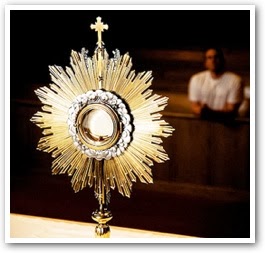Fr. Ed Namiotka
The thoughts and writings of Fr. Ed Namiotka as taken from his weekly parish bulletin columns.
Tuesday, November 28, 2023
Waiting for the Lord
My Definition of an "Uphill Battle"
Sunday, November 26, 2023
Advent is Near!
Christ the King
Dear
Parishioners,
Here
in the United States we are not used to having royalty as
part of our system of governance, as are the United Kingdom and various
European nations. We, as Americans,
declared our independence from a nation ruled by a king.
In
addition, we as an American people go through a seemingly endless and
(sometimes brutal) democratic election process in which we "elect" our president and
other civic officials. Democracy
appears to be part of the fabric of our nation.
So
how do we in our society understand and react to this concept of Christ the King?
First
of all, I have continually reminded people that truth is not subject to
a democratic vote or to a popularity poll. For example, if we were to take a vote and popular
opinion decided there are now four persons in God and God is not a Trinity,
would it make it so? Absolutely
not. Our opinion of this matter
is really insignificant because it can never supplant Divine Revelation. This is also true with morality and the law. Just
because various laws are enacted by our government, it does not mean that these
laws are necessarily morally correct or in conformity with God's will. Laws permitting the unjust taking of
innocent human life illustrate this fact clearly.
When
we call Christ our King, we acknowledge that He has absolute
sovereignty over us as His people and we are subject to what He commands
of us. While we always retain our free-will
and can choose to be obedient or not, God is still ultimately in
charge. Jesus the Christ
announced to us that “the Kingdom of God is at hand.” (Mk.
1:15)
According
to the Catechism of the Catholic Church: "The kingdom of
Christ (is) already present in mystery", "on earth, the seed and the
beginning of the kingdom."(#669) The Catechism
continues: Though already present in
his Church, Christ's reign is nevertheless yet to be fulfilled "with power
and great glory" by the King's return to earth. (#671)
Humanity, as the most integral part of all God's creation, must ultimately conform
to the will of God and
acknowledge the absolute sovereignty of Jesus Christ. Unfortunately, from the very beginning, we as
creatures seemed to think that we knew better and can
do better than God, the Creator. This is the essence of the original sin. Various ongoing effects of this sin continue
to manifest itself over and over again throughout history, right up to this
very time: “Nobody is going to tell
me what to do!”—for some, not even God Himself!
Moreover,
when various Church leaders today advise that we need to listen to and dialogue with
the various peoples of the "world," there must also be an ultimate
realization that in the end the entire "world" needs to conform to
the sovereignty of Christ the King. Christ is the standard of all truth. He is the Son of God. Listening
to and dialogue with others can
never be seen as caving into various worldly
demands and succumbing to anything that would be contrary to Divine or natural
law. It is the world that needs conversion to Christ and His teaching.
May this Solemnity of the Church—Christ the King—remind us of the need to be humble, respectful and obedient to our Lord and Savior, Jesus Christ the King.
It is utter foolishness to do otherwise.
Fr. Ed Namiotka
Pastor
Sunday, November 12, 2023
Tuesday, November 7, 2023
Giving Thanks
- Am I thankful for that fact that I am alive?
- Do I thank God every day for my health?
- Do I take my faith for granted?
- Do I go to bed each night with a roof over my head and a full stomach?
- Do I have a family with whom to spend the holidays?
- If I can read and understand what this reflection is all about, am I truly grateful?
Eucharist Means "Thanksgiving"
In the Novus Ordo Mass, the second major part (after the Liturgy of the Word) is referred to as the Liturgy of the Eucharist. It includes the Eucharistic Prayer when the unleavened wheat bread and grape wine are consecrated and truly become the Body and Blood of Our Lord Jesus Christ. This mystery has been explained using the term transubstantiation, meaning the substance of bread and wine is changed into the Body and Blood of Jesus while the accidents (the appearance of bread and wine) remain the same. The Catholic Church teaches that this change is not merely symbolic but actual or real. Hence, we speak of the Real Presence of Jesus in the Blessed Sacrament or Holy Eucharist.








